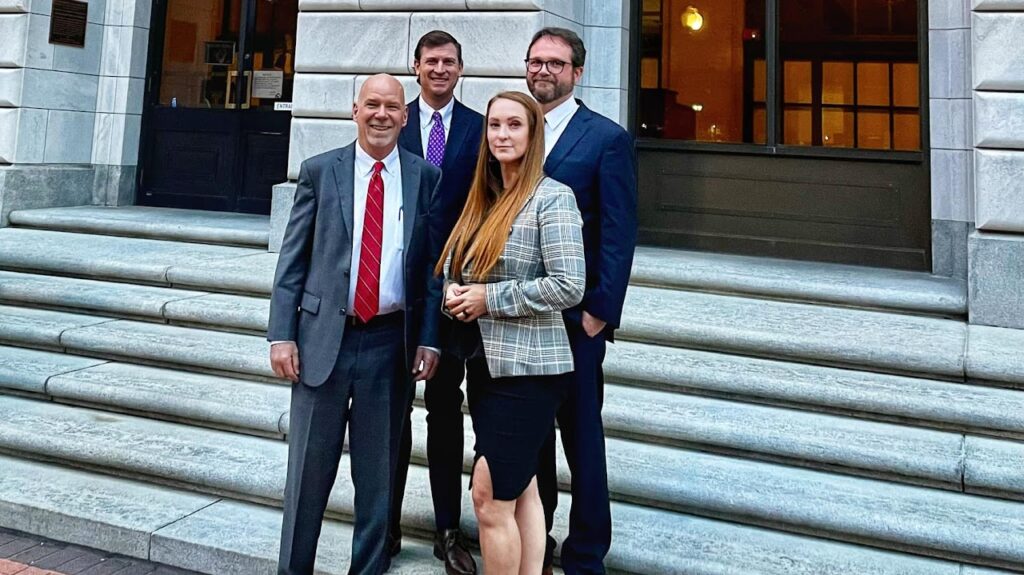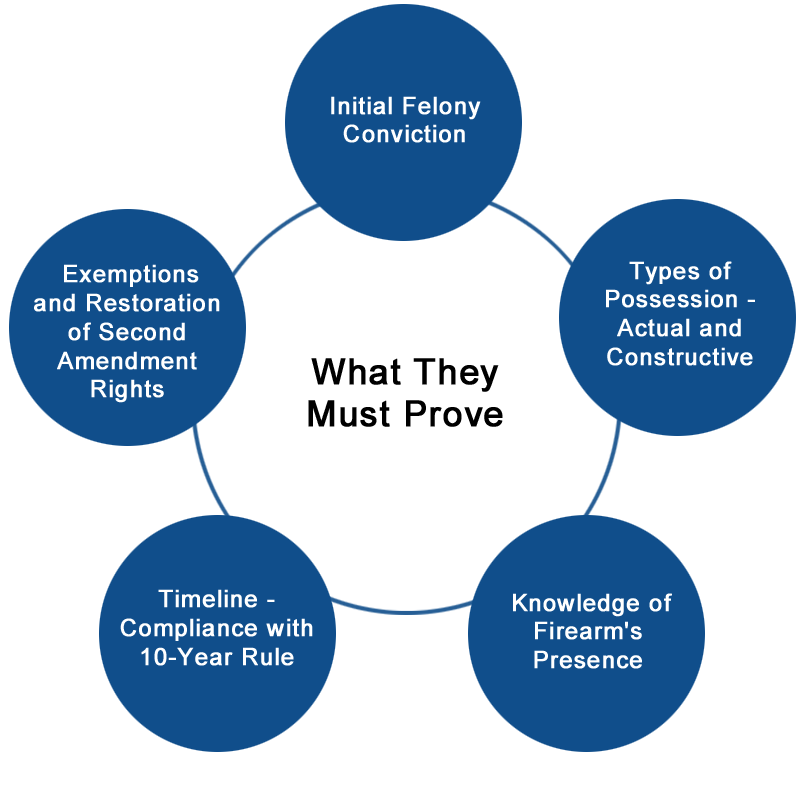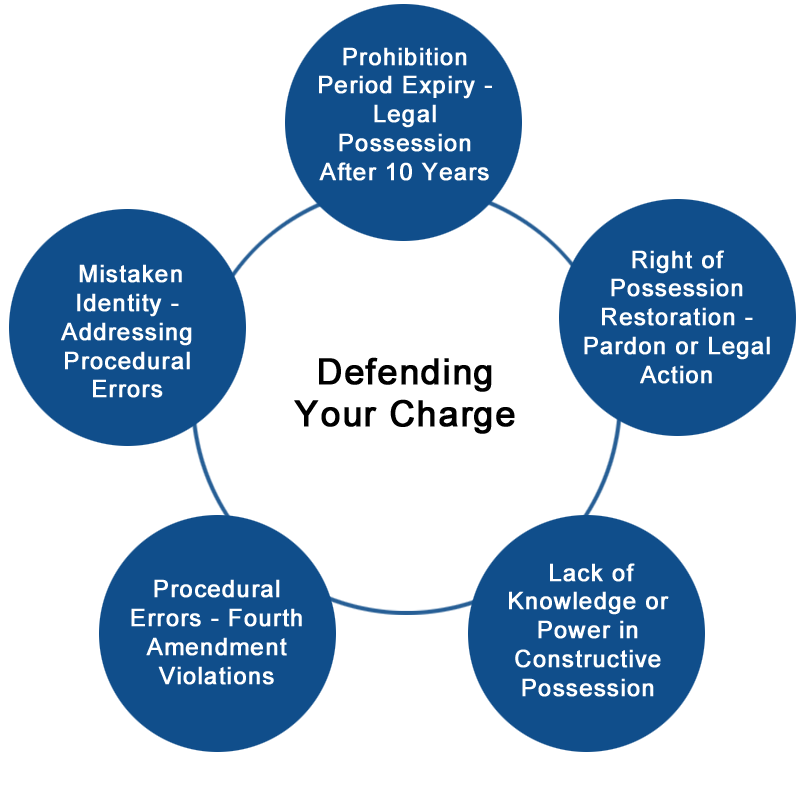
Possession of Firearm or Carrying Concealed Weapon by a Person Convicted of Certain Felonies
One major long-term impact of a felony conviction on your personal record is the way that standing impacts your second amendment rights to own a gun. Under Louisiana law, as outlined in La. R.S. 14:95.1, those who have been convicted of felonies for a violent, drug-related or burglary-related crimes are prohibited from possessing or concealing a firearm on their person. In the context of the law, a firearm is any device which uses explosive force to propel a projectile (e.g. a pistol, rifle or black powder weapon).
Any attempt to circumvent this law can carry a prison sentence up to 7 ½ years as well as fines up to $2,500. Being found in violation can result in a prison sentence between 5-20 years without parole and fines up to $5,000, and can result in additional charges for violent crime if the violation came during commission of a crime. However, this restriction on firearm ownership by felons no longer applies once 10 years have passed since the completion your sentence.
These restrictions were written into Louisiana law with the purpose of creating greater public safety, while decreasing the odds of recidivism among convicted felons.

The Difference Between State and Federal Laws
There are several differences – as well as some overlap – between state and federal law when it comes to gun ownership by a convicted felon.
Louisiana’s laws are outlined in La. R.S. 14:95.1 and state that those convicted of various felonies are forbidden from possessing or carrying a firearm. It further states that those found in violation “shall be imprisoned at hard labor for not less than five or more than twenty years without the benefit of probation, parole, or suspension of sentence and be fined not less than one thousand dollars nor more than five thousand dollars.”
Federal law, as outlined in U.S.C. § 922(g) sets prohibitions for convicted felons on firearm ownership, with mandatory minimums varying based on prior criminal record and the specifics of the case. Usually, if the defendant in question has three or more prior convictions for drug-related offenses or violent felonies, this minimum will be set at 15 years.
While Louisiana law allows for potential restoration of gun rights 10 years or more beyond completion of the defendant’s sentence, federal law carries no such restoration. As such, it is effectively a lifetime ban for those convicted. Various factors will determine whether the violation is prosecuted at the state or federal level.
 “Beyond a Reasonable Doubt:” What They Must Prove
“Beyond a Reasonable Doubt:” What They Must Prove
Like many laws, prosecution of Possession of a Firearm or Carrying Concealed Weapon by a Person Convicted of Certain Felonies by the state of Louisiana requires the state to establish guilt beyond a reasonable doubt. In order to do this, there are several elements they must prove in a court of law.
Initial Felony Conviction: The prosecution must first prove that the defendant had previously been convicted of a felony as defined under Louisiana law.
Possession of a Firearm or Concealment of a Weapon: There are two types of possession that the prosecution can use against the defendant. The first is actual possession, meaning that the firearm in question was found on their person. The second is constructive possession, in which the firearm was in a place under the defendant’s power, for example a home or automobile, and that they had the ability and intention to control the weapon. That intention can be inferred from the specifics of the case, and does not require actual physical possession.
Knowledge: The prosecution must prove that the defendant was fully aware of the firearm’s presence either on their person or within their constructive possession.
History: In deference to Louisiana law, the prosecution must show that the incident in question came before 10 years had passed since the defendant had completed their sentence.
Other Exemptions: There are various other exemptions within the scope of the law that allow a convicted felon to have second amendment rights restored, and the prosecution must show that the defendant meets none of them.
 Defending Against Charges of Possession by a Felon
Defending Against Charges of Possession by a Felon
Being charged with Possession of a Firearm or Carrying Concealed Weapon by a Person Convicted of Certain Felonies does not mean being convicted. There are several strategies that can be used in court to either have charges reduced or dismissed. These included:
Demonstrating that the prohibition period has expired. Under Louisiana law, a convicted felon may be legally allowed to own a firearm if more than 10 years have passed since completion of their sentence.
Showing Right of Possession. In some cases, a gubernatorial pardon or other legal action may restore a convicted felon’s right to bear arms. In other cases, it can be demonstrated that the prior conviction was overturned or incorrectly classified as a felony, essentially meaning that the defendant never lost their rights to possess a firearm. It also possible to assert that the defendant was innocent of the original felony, but this complex defense is generally employed post-conviction.
Lack of Knowledge or Power. In cases of constructive possession, it could potentially be demonstrated that the defendant either did not have knowledge of the firearm’s presence or did not have control over it at the time.
Procedural Errors. If law enforcement did not have legal authority to search the defendant or their premises, this can be a violation of the fourth amendment. In addition, procedural errors could have led to a case of mistaken identity.
Schedule a No-Obligation Case Evaluation Today
If you have been charged with Possession of a Firearm or Carrying Concealed Weapon by a Person Convicted of Certain Felonies, we invite you to review the specifics of your case with our defense team. During the free, no-obligation consultation, we will demonstrate our proven method for addressing these charges, digging deep into the evidence and analyzing every nuance with meticulous strategies that yield a favorable outcome for you.
Don’t let the fear and anxiety of facing these charges stop you from doing everything you can to regain your freedom. Submit your content information below to schedule a free case evaluation today.
Call (504) 294-8552 or Schedule a Free Case Evaluation Online
